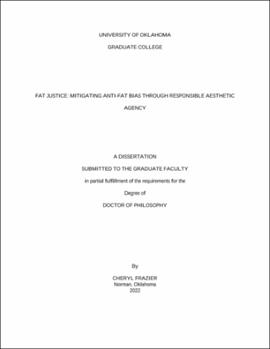| dc.description.abstract | In my dissertation I develop a series of guidelines for responsibly and respectfully navigating varying facets of aesthetic activity involving fat communities. I argue that fat people's engagement with the aesthetic can be used to foster community, resist anti-fat bias, and move towards fat justice. Moreover, I argue that considering representations and treatment of fat people in the production of art must be done carefully in order to avoid perpetuating negative stereotypes and anti-fat bias. My project aims to improve the visibility of fat people, ensuring that fat communities can determine how and when they are seen in ways that affirm their identities and experiences.
My project is broken down into four chapters, each of which tackles a different dimension of aesthetic engagement and activity. In the first, I develop a framework called "responsible aesthetic agency" for creators to use when depicting fat people in their work. I intend responsible aesthetic agency to be a way for creators to meet their bare minimum ethical obligations to fat people, and as such this framework is a precursor to (but importantly different from) Jeremy Fried's aesthetic allyship (which I take to entail a deeper, longer-lasting commitment to allyship not required for my account of responsible aesthetic agency). I use this framework to argue that artists must attend to the narrative webs in which a work exists when designing their new work's narrative, and that fat people must be active participants in this design and in the realization of said narratives.
My second chapter addresses how individuals can use aesthetic agency to advocate for themselves and their communities. I argue that beauty labor can be used to help dismantle anti-fat bias. Using Kathleen LeBesco's framework of agency and identity, coupled with Jeannine Gailey's assessment of the unique perception of fatness as simultaneously hypervisible and hyperinvisible, I argue that participants in the "Fuck Flattering!" movement shape their identities and advocate for fat communities by forcing society to acknowledge their visibility and worth.
In my third chapter, I consider representations of fatness in popular media, arguing that we can best achieve fat visibility through centering imperfect representations of fatness. I use Anne Eaton's "Taste in Bodies and Fat Oppression" as a starting point. In this paper, Eaton argues that distaste for fat bodies has an affective element of disgust that we must address to mitigate anti-fatness. Eaton argues that we must habitually engage with vivid and engaging representations that encourage us to see fat bodies as likable and attractive. I argue that while this approach has worthwhile aims, it risks leaving behind those fat bodies which we cannot bring ourselves to see as likeable or attractive (especially larger and disabled fat bodies, which deviate furthest from the type of bodies we collectively deem attractive). To better combat our distaste for fat bodies, I argue that we must show fat people as complexly as we show thin characters onscreen, highlighting the pluralities of ways to exist as a fat person.
Lastly, in my fourth chapter I discuss how to appropriately engage with marginalized communities as a member of a dominant group or identity. I examine the co-optation of the body positivity movement, outline the ethical harms that result from said co-optation, and discuss potential avenues for moving forward with the movement given its co-optation (including body neutrality, proper body pride, and radical self-love). I argue that in order to fully address the myriad levels of goals of the original body positivity movement (personal, community-oriented, and advocacy/activist goals), none of these three alternatives is sufficient, as each misses a crucial element of the original body positivity movement or asks participants to have too narrow of an attitude towards their own body. Given the shortcomings of these movements, I argue we should move forward from the body positivity movement’s co-optation by employing a modified framework of Aubrey Gordon’s concept of fat justice, one which also makes room to recognize the importance of fat people being able to experiment with beauty and see themselves as beautiful. | en_US |
